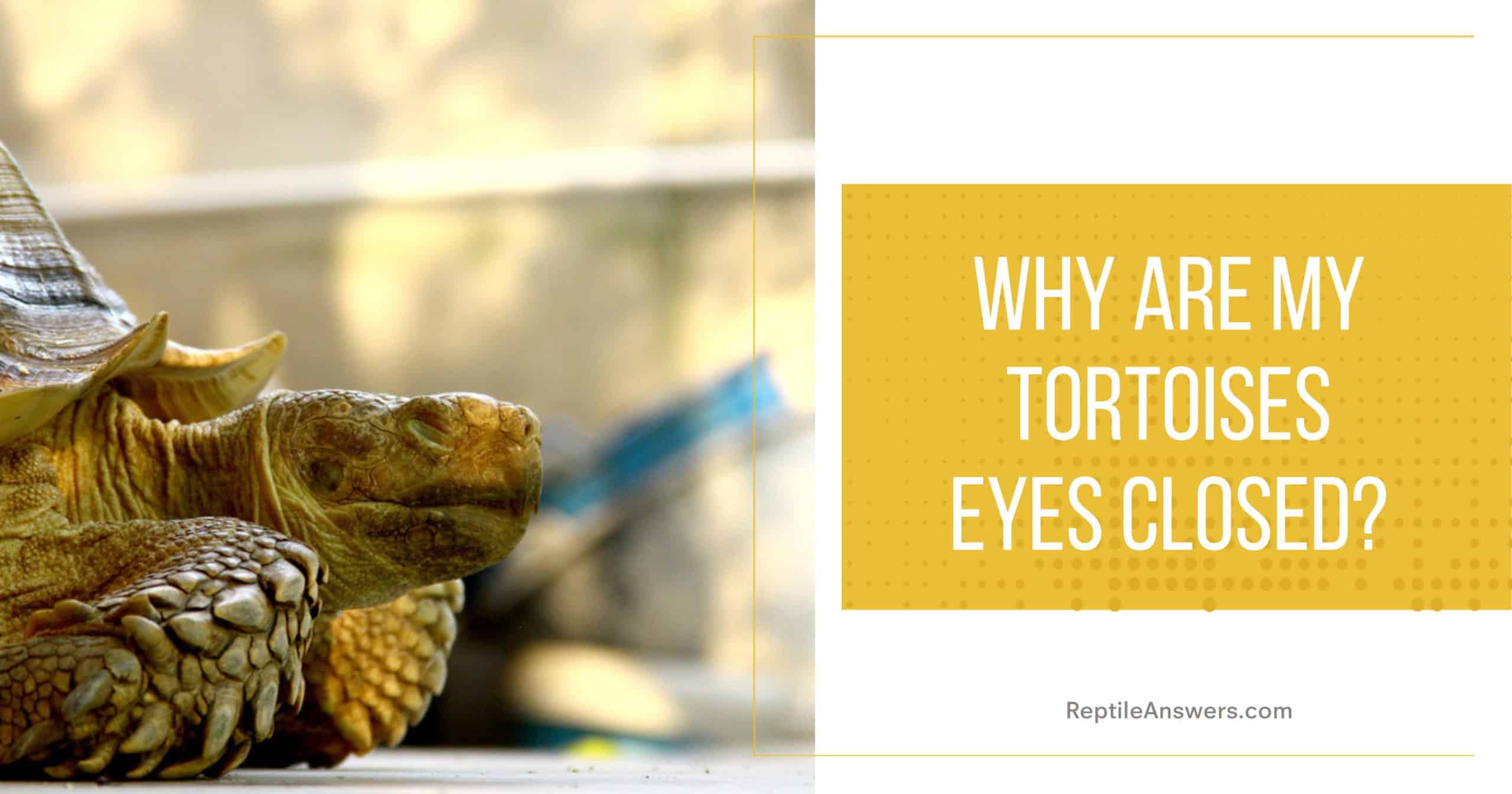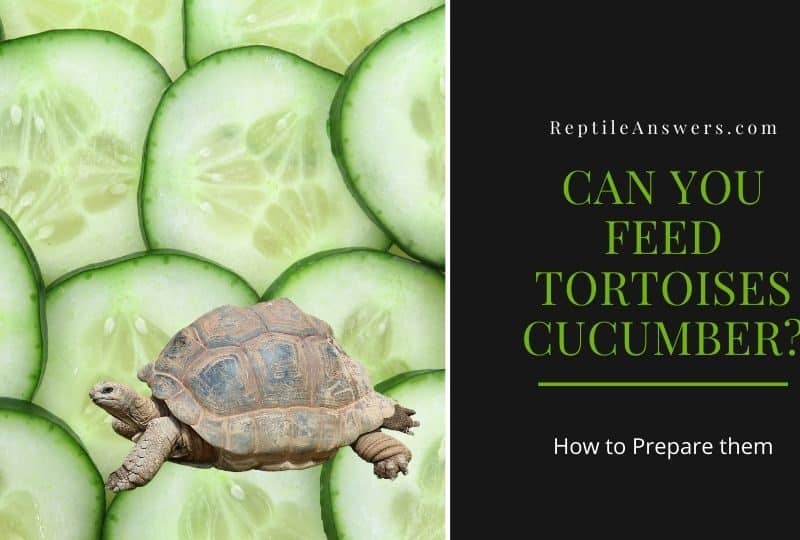It looks like your Tortoise has trouble using his eyes. Most likely your tortoise would still like to socialize with you but, if he keeps his eyes closed we are worried about his health. Your tortoise may need to see a vet.
A tortoise’s eyes may stay closed if it has a vitamin A deficiency, post-brumation anorexia, third eyelid issues, trapped plant matter, infected or swollen eyelids, and abscesses. A white film can develop from poor water quality, which leads to fungal and bacteria growth in the eye.
The majority of these conditions are treatable. They won’t lead to blindness, and your tortoise won’t be forced to keep its eyes shut forever. For benign issues, like trapped plant matter, you can easily wash out any debris. Other more serious issues will need antibiotics prescribed by a vet and follow-up treatment.
Why Aren’t My Tortoise’s Eyes Opening?
Tortoises sleep for long hours throughout the day, spending this time with their eyes closed. However, if you find your tortoise unwilling or unable to open its eyes later, it’s cause for concern.
Perhaps the tortoise wanders around with a single eye closed all the time. Maybe your tortoise gets up to eat or drink after a nap but still doesn’t open its eyes. In the worst case, your tortoise’s eyes may remain shut, while also creating discharge or producing a white film.
There are various reasons why your tortoise isn’t opening its eyes. Some are benign and your tortoise will recover on its own. Others are more serious and need your intervention, alongside assistance from a vet.
Vitamin A Deficiency
A vitamin A deficiency, commonly known as hypovitaminosis A, could be why your tortoise’s eyes are closed. A tortoise’s liver stores vitamin A and, as the tortoise grows, its body uses up the resource. If this nutrient isn’t replenished in its diet, then the tortoise may begin showing signs of hypovitaminosis A.
This deficiency is a direct result of giving the wrong foods to a tortoise. Diets that lead to hypovitaminosis A include:
Iceberg lettuceLow-quality commercial feed productsMeat
A lack of vitamin A in your tortoise can break down the epithelial tissues around the eyes. This can make your tortoise’s eyes more prone to swelling. As a result, your tortoise’s eyes may also become susceptible to secondary bacterial infections that require veterinary attention. Hypovitaminosis A can lead to conditions such as:
Swollen eyes leaking with pus-like dischargeChanges in the epidermisLoss of appetiteChanges in the mucus-producing glands in the mouth and upper respiratory tractWheezingLethargic movements
Fortunately, vitamin A deficiency is treatable. Your vet will most likely recommend an oral supplement. If the condition has become severe enough to stop your tortoise from eating, a vet might administer an injection of vitamin A.
Post-Brumation Anorexia
According to the Veterinary Nursing Journal, a tortoise lives off its own fat reserves and reabsorbs water from its bladder during brumation. Therefore, prepare your tortoise for the process beforehand.
You should monitor your tortoise during brumation to ensure it wakes up effectively later on. If things don’t go well, then after you wake your tortoise up, it may not be able to open its eyes.
After brumation, it’s normal for the eyelids to be sticky. The tortoise naturally produces mucus to keep its eyes moist during brumation. This can build up while the tortoise keeps its eyes closed for several weeks. Afterward, it will fade naturally with a soak or some burrowing.
In benign cases, this is why your tortoise is struggling to open its eyes. The problem will last for a short amount of time and resolve itself. However, if you notice it continuing long-term, it could lead to post-brumation anorexia.
Since a tortoise is not able to open its eyes due to its stickiness, it is also unable to see its food. This leads to an inability to eat and, thus, anorexia.
Signs include the tortoise refusing to drink within 48 hours of being awake and not eating for a week after waking up. Here’s a brief list of other factors that contribute to post-brumation anorexia:
Brumating for too longLow level of white blood cells in the bloodUnable to reach the right temperature after wakingContracting a disease during brumationBeing traumatized during brumationAn underlying and undiagnosed chronic condition
If the warning signs present themselves, you should visit a vet right away. The expert will most likely suggest inserting an esophagostomy tube to cure the issue. Don’t try to fix the problem at home. The tube treatment will require fluid therapy to allow the tortoise to heal fully. However, it may take up to 2 months before your tortoise can feed itself.
Dehydration or Infection
If your tortoise cannot open its eyes, conduct a quick inspection to see if there is swelling in the eyelids. This is caused by vitamin A deficiency or post-brumation anorexia. However, in some cases, the swelling might occur due to dehydration.
Dehydration can cause occlusion of the central retinal veins, which carry blood out of the eyes. As a result, the eyes are unable to receive adequate blood flow, making it hard for your pet to open them.
In response, you should give your tortoise regular water soaks for 2-3 days. This is called rehydration therapy, as it helps your tortoise absorb water through its skin. This improves blood flow and reduces swelling in most cases.
If the swelling does not go down, you should contact a vet. An expert will conduct a thorough inspection. It may be found that your tortoise has a bacterial infection. In this case, the vet will likely prescribe antibiotics. These will be administered directly to your tortoise’s eye as eye drops, or orally with the tortoise’s food.
Don’t worry if the swelling is due to an eye infection. This is usually a mild condition that occurs when bacteria, viruses, or fungi enter part of the eye or its surrounding area. Eye infections are treatable and rarely lead to blindness.
Third Eyelid Problems
If you’re wondering, “why is one of my tortoise’s eyes closed?” this is likely the cause. According to the Journal of Zoo and Wildlife Medicine, a tortoise’s third eyelid is operated by a muscle and tendon. It’s hard to see the third eyelid, and you may only catch a glimpse as it passes over the corner of the eyeball. If there is a problem with your tortoise’s third eyelid, this membrane becomes more pronounced and inflamed.
Problems with the third eyelid usually occur after brumation. During this time, the eyes stay closed for an extended period. For some tortoises, that leads to an excess of mucus, while in others, it causes the eyelid to dry out. This makes it difficult for your tortoise to open its eyes.
The dry eyelid may be stiff, scratchy, or painful for your tortoise to open. As a result, it will avoid it whenever possible. If your tortoise does open its eyes, it may only close them partially. That sign makes it easier to notice and rule out this condition. There’s a treatment for third eyelid issues that you can carry out at home:
Boil some water and allow it to cool. This will sanitize it.Drop warm water on your tortoise’s eyeball. This will moisten up the third eyelid, so it can retract to its usual place.
Trapped Plant Matter
Hungry tortoises put their face into places they are not supposed to. As a result, plant material gets caught inside their eyes. This causes the tortoise’s eyelid to get stuck to the plant material. The good news is that trapped plant matter is easy to deal with and you don’t need to involve a vet.
Most of the time, the treatment (above) will quickly remove the trapped material, and your tortoise will start feeling better. If the boiled water technique does not work, get antiseptic eye drops from the pharmacy. These drops will ease the plant matter out of your tortoise’s eyes.
Abscess
Skin problems aren’t as common in tortoises as they are in other pets, but they aren’t unheard of. If your tortoise gets a cut anywhere on its skin, it can develop an infection. This can lead to an abscess, which is a spot full of pus.
An abscess that forces your tortoise to close its eyes in pain is likely to be visible. It shouldn’t be tough for you to figure out what the problem is.
To treat an abscess, you will need to involve a vet. It’s best to avoid squeezing, wiping, or cleaning it at home because this will only aggravate the infection and make things worse.
A vet will suggest a treatment that involves draining the pus from the abscess. They might also prescribe antibiotics to clear up the infection. This will always be paired with regular cleaning until the spot has healed entirely, so it doesn’t get reinfected.
Tortoise Walking with Eyes Closed
There are times when it’s natural and harmless for a tortoise to keep its eyes closed as it walks around. Some tortoises like to close their eyes when there is:
A lack of humidity and overexposure to UVB light
Closing their eyes at all times, even while walking, enables them to keep their eyes moist. However, if the humidity level in your tortoise’s enclosure is not the issue, you should take your tortoise to the vet.
Why Is My Tortoise’s Eye Stuck Shut?
If your tortoise’s eyes are physically swollen shut, it might be due to an ear abscess. Ear abscess occurs primarily due to bacterial infections. A vet will be able to treat early-stage abscesses with injectable antibiotics. A more advanced condition may require the vet to perform surgery to open and drain the abscess.
What Causes a White Film Over Tortoise’s Eyes?
Some tortoises develop a white film over their eyes. This is usually due to poor quality water, found either in their bath soaks or in their drinking dishes.
If the enclosure is too small for your tortoise, it’ll also get dirty when your tortoise explores. The tortoise can track substrate and feces everywhere, including its dishes. This will cause the water quality to go down. You may observe your tortoise catching different kinds of diseases as a result.
Sometimes, the lack of a good basking area or a weak basking light also causes a white film over a tortoise’s eyes. The tortoise will get a vitamin D deficiency, which will harm its immune system. This can allow fungus and bacteria to thrive, which can lead to a white sheen on the eyes. To prevent this, you should:
Change the water in its enclosure regularly and avoid giving it soaks in dirty water. Ensure that your tortoise’s enclosure has a basking place, a UVB light heat lamp, a ramp, and space to move around. Avoid overfeeding your tortoise. If there are leftovers in its enclosure, pick them out.
If the white film persists despite all preventative measures, seek the guidance of a reptile vet. Don’t try any medicine on your own without a vet’s guidance. Tortoises don’t keep their eyes shut constantly for no reason, and resolving the problem can get your tortoise wide-eyed and active again.



